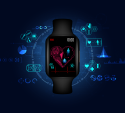The Importance of EDC: How EDC can boost the success of the clinical trial

In our last blog post, we marked the importance of robust tools for electronic patient data capture for the success of decentralized trials. Now, we will dive deeper into the specifics of Electronic Data Capture (EDC) systems and their benefits for clinical trials.
What is EDC?
With the use of EDC, researchers can collect, clean, transfer, and process clinical data electronically. Moreover, all collected data is available in real-time, which allows immediate analyses and adaptations. EDC systems can save a lot of time and effort, and improve the quality of data, thus expediting the research process. In addition, web-based software for electronic data capture ensures secure and easy access to clinical data from anywhere. This was critical during the COVID pandemic, as it allowed many trials to keep operating.
What information can be collected using EDC?
Clinical research organizations collect a huge amount of clinical information. EDC systems make data collection much easier and can be used to record many different types of clinical data, such as:
- Patient-Reported Outcome
- Real-world data or data collected by wearable devices and apps
- Medical history data and information about patients’ status and conditions
- Test results from labs or other suppliers
- Quality of Life information
- Electronic consent and more.
Benefits for the CROs:
Streamlined data collection
Clinical trial sites can access the EDC system from anywhere, thus entering data easily, without the need for writing, and shipping paper forms. Patients can enter health information and feedback on the treatment from the comfort of their homes. In addition, the EDC system can be connected to wearable devices and thus automatically collect RWD (real-world information). However, the benefits do not stop here. All data collected by trial participants and wearable devices, or entered by the trial site, is immediately available to data reviewers. This can optimize the process and significantly decrease the time for processing information.

Better quality data
One of the key benefits of EDC systems is the minimization of errors in entered data. What do we mean? A robust EDC system will run automatic checks for any transcription errors and discrepancies when entering new data. For example, the system will prompt immediate corrections if data is not in the right format. This significantly improves the quality of the data and decreases the time needed for data review and corrections.
Enhanced efficiency
When using an EDC, you store all clinical data on one centralized system, which allows secure access to up-to-date information. In other words, the clinical trial team can process and analyze data remotely right after its collection. The PIs and CRAs can remotely review and monitor data and the sponsor or CRO can track the study’s progress in real-time. In addition, repetitive tasks can be automated to save a lot of effort.

Accelerated study completion
An EDC system helps for faster completion of studies due to streamlined processes and optimized efforts required to conduct a trial. With the use of a centralized system, clinical trial staff can easily create and process forms; enter data; open or resolve queries; and analyze the data in real-time and remotely. This decreases the waiting time and allows different trial teams to complete their part sooner, which results in quicker study completion. Moreover, EDC systems validate the entered data and ensure data accuracy. Fewer errors mean less time for corrections.
Improved data security
When data is stored on paper there are no backup or recovery options in case this data was destroyed. If you lose your data, you lose it for good. Cloud-based systems provide data backups and improved traceability of any changes. Moreover, the access to EDC is via role-based permissions, which means sensitive clinical information can be accessed only by the authorized clinical staff.
At last, integrating an EDC system with your CTMS streamlines the processes of collecting and processing clinical trial data, minimizes errors and discrepancies, eliminates the need for double data entries, and accelerates trial completion.
Clinicubes CTMS provides end-to-end clinical trial management for hospitals, site management organizations, and small CROs with a focus on budgeting, finance tracking, and reporting. In addition, it has built-in integration with Metaforms, а sophisticated data collection platform, which simplifies the collection of health information and patient feedback and provides up-to-date access to all required clinical data.
Interested in learning more?
Contact us to find what we can do for you or request a virtual demo today!




